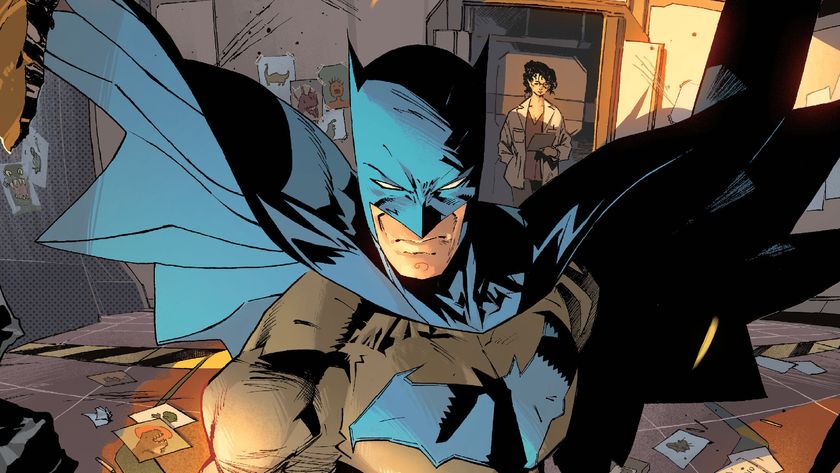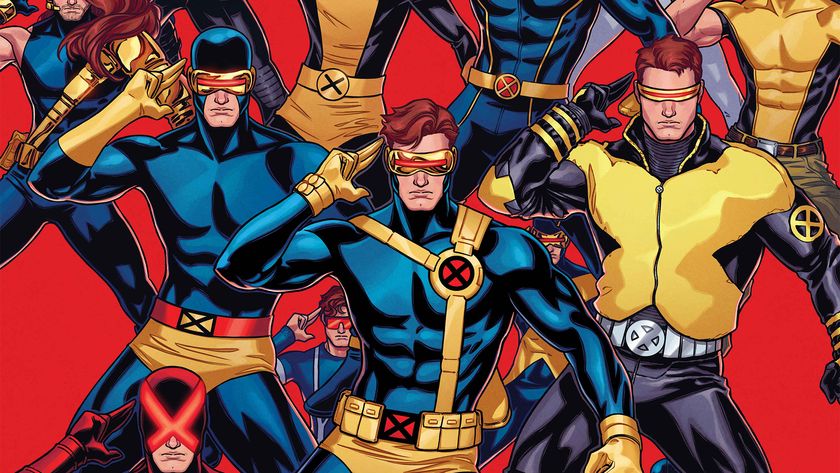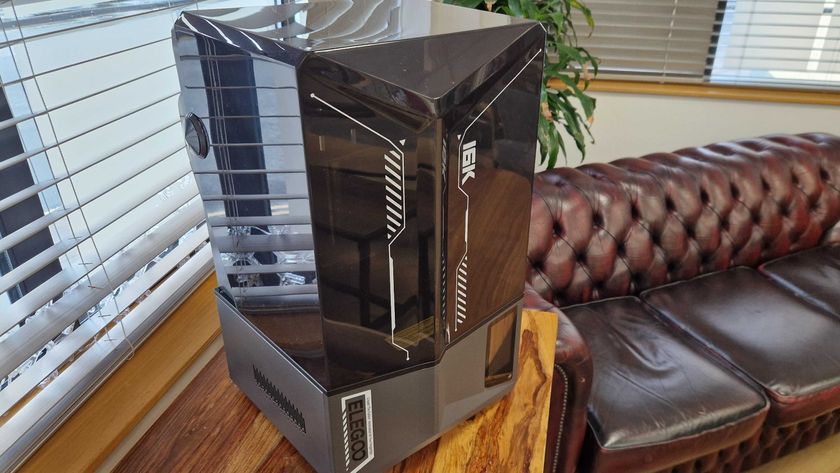Return to The O.Z. - the Occupied Zone - in new war comic
Baum's The Wizard of Oz gets an unofficial sequel in the war-torn world of The O.Z.
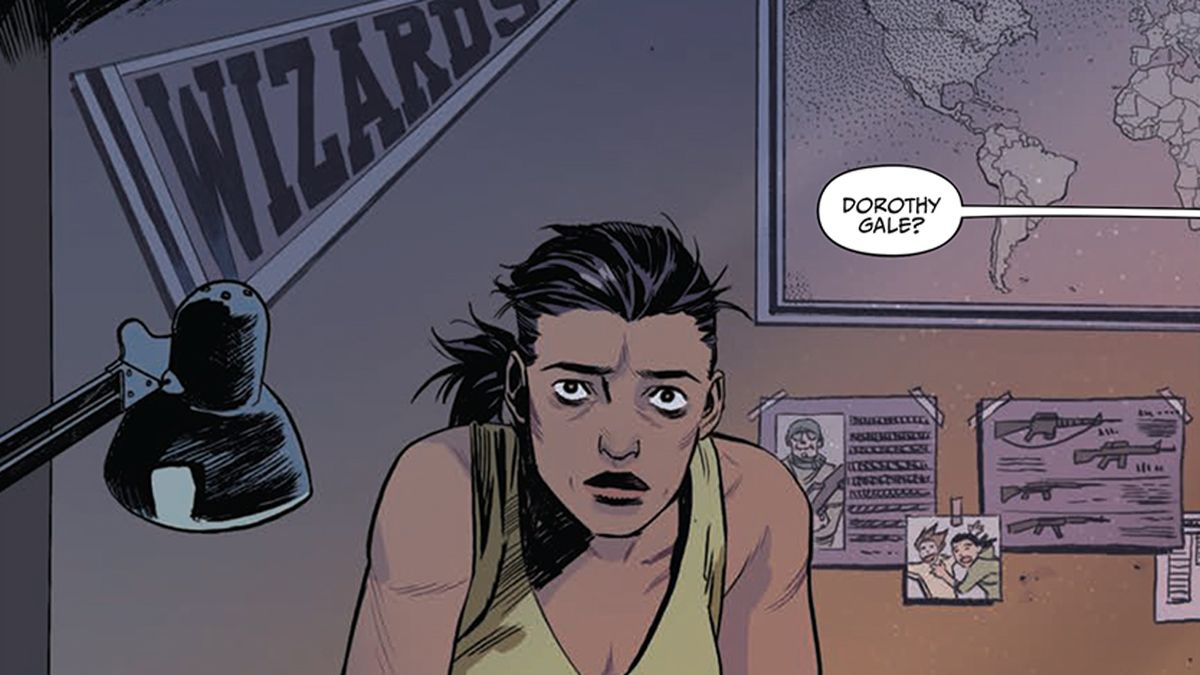
You know about Oz - but do you know about The O.Z.? As in the Occupied Zone.
Writer David Pepose and artist Ruben Rojas have reimagined Frank L. Baum's fantastical realm into a gritty Hurt Locker-esque war story.
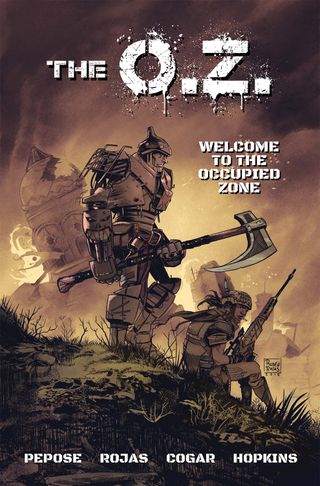
Scheduled to debut this December, The O.Z. is a new three-issue series that follows up after Dorothy slew the Wicked Witch of the West and freed the land of Oz. As it turns out, the removal of a mad dictator didn't in itself improve life for those in the realm of Oz.
Pepose, a Newsarama alum, launched a Kickstarter on August 17 in hopes of raising $6,000 to publish the first issue. Four days later, and he's quadrupled that with $24,126 to date.
We talked with Pepose about The O.Z., twisting Baum's classic story, and the success of the project's Kickstarter.
Newsarama: David, tell us the basic premise of The O.Z.
David Pepose: The hard-and-fast pitch for The O.Z. is like what if Mad Max and The Hurt Locker took place in The Wizard of Oz. Our story reimagines Dorothy Gale's killing of the Wicked Witch of the West as something like a botched regime change — and when Dorothy clicked her heels three times and returned to Kansas, she unwittingly left Oz in the throes of a horrific civil war.
Comic deals, prizes and latest news
Get the best comic news, insights, opinions, analysis and more!
The O.Z. picks up a generation later with Dorothy's granddaughter and namesake, a disillusioned Iraq war veteran who has returned home to care for her ailing grandmother, and hopefully put the pieces of her life back together after her time overseas.
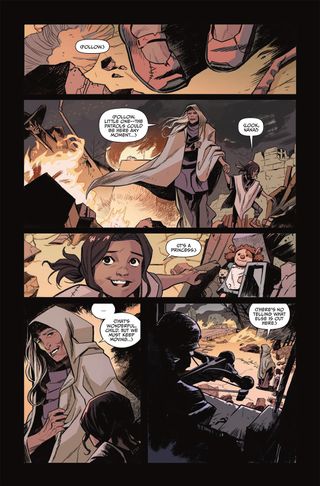
But when she's swept up by a tornado and dropped into this magical battlefield, our new Dorothy will have to confront her past — and her grandmother's former friends — if she hopes to bring peace to the Occupied Zone… or as the locals call it, 'The O.Z.'
Nrama: What inspired this particular take on the story?
Pepose: I've been working on The O.Z. since the release of my first book, Spencer & Locke — The O.Z. was actually one of the first three ideas I came up with after that initial series, with the other two books being Spencer & Locke 2 and Going to the Chapel.
When I was mulling over ideas, I wrote down a lot of classic fantasy for inspiration — Lord of the Rings, Lloyd Alexander, Piers Anthony… and The Wizard of Oz. I think seeing it on the screen really made it click for me — seeing the word 'Oz' made me think of it as an acronym, which immediately made me think of the "Occupied Zone."
If you look at the original Wizard of Oz, the parallels feel unavoidable — if Dorothy killed the Wicked Witch and then split, it wouldn't wrap up in a neat little bow. It'd be a full-on power vacuum leading to war.

The whole story kind of crystallized in one cohesive mental image, which artist Ruben Rojas portrayed magnificently on our main cover — seeing Dorothy as a world-weary soldier bringing her Army training to Oz, or the Tin Man as someone who has been destroyed and rebuilt so many times that he's become this armor-plated war machine.
The idea of seeing this iconic fantasy world through the lens of war felt like a story I could instantly sink my teeth into.
Nrama: Tell us about your version of Dorothy.
Pepose: Dorothy Gale is the granddaughter of the original Dorothy from L. Frank Baum's Wizard of Oz. But whereas grandma Dorothy had been a wide-eyed Kansas farm girl, our new Dorothy was a soldier, and she's seen some things from her time in Iraq and Afghanistan that's really left her in a bad place.
Since her return to Kansas, Dorothy's been taking care of her grandmother, struggling to readjust back home as she's regaled with stories about Munchkins and Emerald Cities and magic on the other side of the rainbow.
Of course, when a tornado hits their sleepy Kansas town, Dorothy's going to realize her grandmother's stories aren't as rose-colored as she believed — and that will really be much of Dorothy's emotional journey through The O.Z.
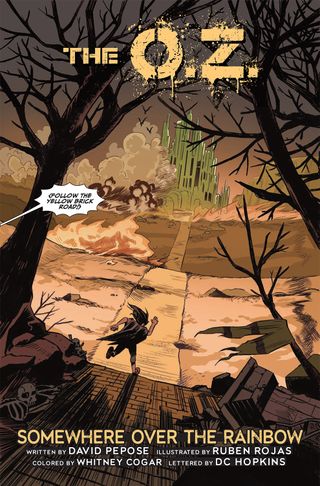
On the one hand, Dorothy's going to see this new battlefield through the lens of a trained soldier — she will see these bits of magic as weapons to defend herself and others. But because of her grandmother's near-saintly reputation as the woman who killed the Wicked Witch, Dorothy is also going to grapple with the burden of leadership and responsibility.
How do you make moral decisions during wartime, when every choice you make could wind up with someone's blood on your hands? And in Dorothy's case, she's already been a soldier in a strange land, in a war that seemingly has no end. It's very double-edged — so much of her journey will be about both navigating her past traumas that The O.Z. stirs within her, but there's a part of her that can't help but see The O.Z. as a second chance to make things right.
Nrama: What kind of research did you have to do for Dorothy's military background?
Pepose: Before I made the jump to working in television and comics, I actually got my start as a newspaper reporter, and two of the beats I had inherited were the local mental health and military beats.
This was in rural Western Massachusetts, an area that comparatively got much less taxpayer money, much less infrastructure, and much less spotlight than places like Boston or even Springfield — and I did a lot of interviews with returning veterans who were struggling to readjust back home.
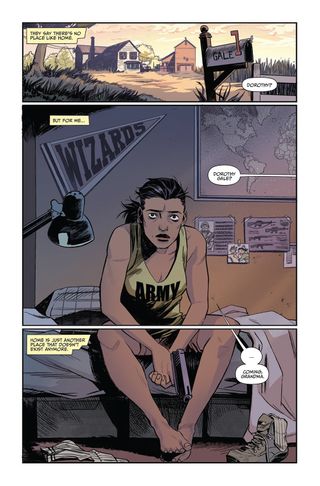
Some of these stories were heartbreaking, and others were truly inspiring — but I think those stories really stuck with me, and really influenced the kinds of themes about trauma, guilt, and redemption that I would explore in my comics work.
I was also fortunate enough to be able to chat with friends of mine who have served and be able to pick their brains on some of the macro elements of war, particularly in regards to Iraq and Afghanistan. While I'm not going full Greg Rucka or Larry Hama — these guys have literally decades of experience and research on me, and it permeates every line of dialogue and dramatic choice they make — the conversations I had really helped me shape the overall trajectory of this story… particularly the conversations about why our wars feel so endless.
The question of tyrants and leadership was something that popped up early on in the development process — like it's easy to say, "there's the bad guy, let's take him out." But that's the insidious thing about despots — they don't just wield massive amounts of power through fear, but they're also beings of this deeply centralized control. You topple that first domino, suddenly you get a lot of unexpected ripple effects.
So, you can't tackle a war story like The O.Z. without exploring power, responsibility, corruption, and U.S. interventionism.
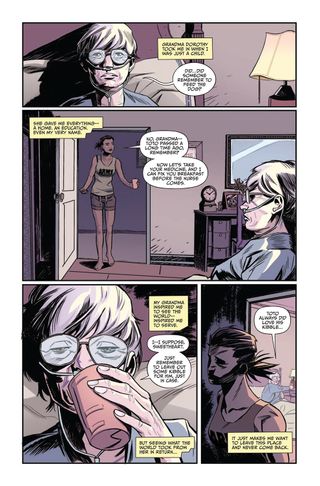
Nrama: Who are some characters we'll encounter, without spoiling too much? Will there be Wheelers? Wheelers are messed up.
Pepose: Wheelers are super messed-up! You know, it's funny, because when you're dealing with The Wizard of Oz as a property, you have to really thread that needle — because while the L. Frank Baum novels are in the public domain, the Judy Garland film is not… and yet, the Judy Garland film is the sort of universal touchstone that people respond to.
But you can't use things like the Ruby Slippers, since they were an invention for Technicolor… but at the same time, you have to really pick your battles with which bits of the mythos you want to incorporate into the mix.
Nrama: They were silver shoes originally, but that's just not as cool.
Pepose: For me, for the sake of accessibility, we really wanted to focus hard on the core group of Dorothy, the Tin Soldier, the Scarecrow, and the Cowardly Lion — but in a way where we get to both build on the universal archetypes that we all know and love, while still being able to reimagine and remix them in a way that feels organic and germane to the story.
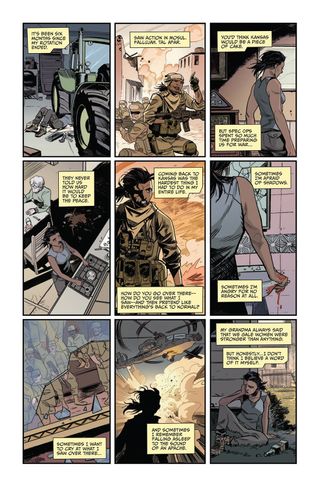
The Tin Soldier, for example, is one of my favorites, since he's been turned into this towering, armored freedom fighter — he's the guy who wanted a heart, but how much of your heart can survive when you've seen so many friends fall in combat?
Or the Scarecrow, who was a really fun character to write — he's discovered that intelligence can be a real monkey's paw situation. Sometimes even the smartest person in the world can't solve every problem — sometimes they can only be just smart enough to see how badly things are going to go.
And that's not even including the Wizard of Oz — I'm so happy with the take we did on the character, and I think they're going to wind up turning into a real fan-favorite.
Nrama: Tell us about your creative team.
Pepose: I've been incredibly fortunate to work with the creative teams I've collaborated with on my previous books, and The O.Z. just continues that winning streak — this might be one of the most beautiful comics I've ever had a chance to work on.
Artist Ruben Rojas was the first person I approached for this series, after seeing him respond to a call for artists on Twitter back in 2018 — he's got this style that's very reminiscent of Sean Murphy, but with a really lush inking style that I think makes his work so accessible and inviting. Ruben has added so many layers to The O.Z. thanks to the way he's fleshed out our characters and the world they reside in. When I saw Ruben's cover featuring the Tin Soldier, I made him a promise right then and there — come Hell or high water, I would get this book made, no matter what.
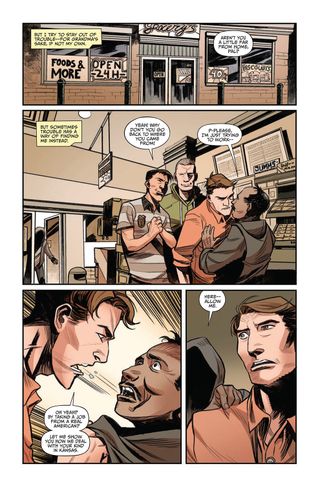
Colorist Whitney Cogar and letterer DC Hopkins were both recommendations from fellow Newsarama alum Michael Moccio, who has gone on to work at BOOM! Studios, Scholastic, and Mad Cave. I can't say enough good things about Whitney — she's our secret weapon, our third heat, the X-factor that elevates The O.Z. from being simply good to something great. DC's such a gracious and good-hearted collaborator, and he and I have very similar sensibilities when it comes to balancing dialogue against art.
Nrama: Why did you decide to go the Kickstarter route?
Pepose: I've been looking at Kickstarter for a long time — I'm friends with a lot of people who have had a lot of success on the platform, and as I spoke with them, the more I realized that Kickstarter is its own ecosystem — there are people who buy their books primarily on that platform, the same way that there are people who primarily buy their books at comics shops or Amazon and ComiXology.
But I think the COVID crisis definitely inspired me to finally take the leap. There's a lot of things in flux with the industry right now — and as such, there's been staggering with new releases. We already had two issues of The O.Z. ready, so it felt like solving one problem with another — why wait years to release this book when we could introduce ourselves to the Kickstarter community by bringing our absolute A-game?
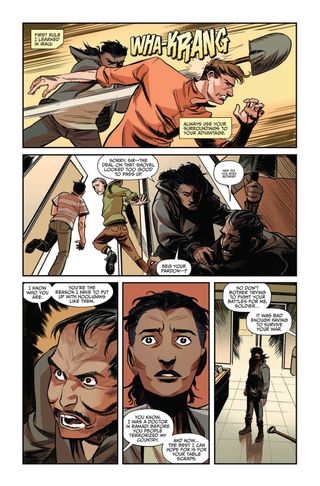
Nrama: What kind of research did you do before putting the Kickstarter together?
Pepose: Honestly, some of the best research is just checking out Kickstarter campaigns from people who have succeeded before. What's really great for me is that this research really put the final pieces together for me being self-sufficient as a comics creator. I had already put a lot of thought into how to write a comic, but figuring out printing? Production? Shipping? These are core skills that will last me my career, so I'm really grateful for having the chance to learn them for this Kickstarter campaign.
Nrama: Why do you feel people keep coming back to Oz as the basis for stories, and what are some of your favorite interpretations of Baum's universe?
Pepose: It's a great question and one that I think ties into why I like to reimagine nostalgia through a darker lens. Oz isn't just a world filled with archetypal characters, but I think by virtue of it being a cultural touchstone for so many of us as children, we bring that sense of innocence and wonder to it — it's not just the subject material itself, but how we were when we first experienced that world. That universality I think lets us explore heavier topics, because readers believe in these iconic characters, and instinctively know they won't break.
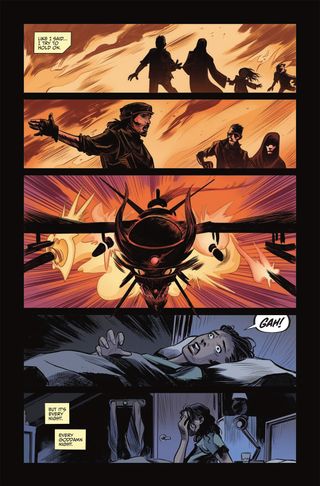
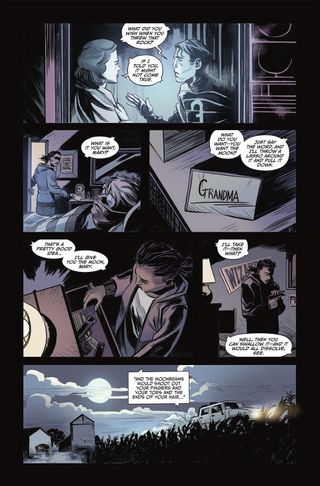
As far as my favorite reinterpretations of Baum's universe, I could go on… I mean, like we were discussing earlier, even the Garland film is its own remix! But for me, I really liked Wicked and Return to Oz — Return to Oz because it remixes the formula of the original Oz story, but channels it through this dark and gnarly lens. It sort of paved the way to give us permission to tackle a war story in Oz, you know?
But Wicked might be my favorite because it subverts expectations by putting us in Elphaba's head, really analyzing her own internal angst as well as her genuine desire to make things right via revolution. Expect The O.Z. to take some pages from that playbook... minus the killer solo ballads, of course.
Nrama: What can readers expect from the story? What is the biggest theme or idea you want to convey through it?
Pepose: The O.Z. builds upon a lot of the themes of trauma and guilt from my previous work in Spencer & Locke, but at a larger scale and with commensurately higher stakes. Because Dorothy's struggle isn't just one person's psychological journey or even one person's survival — she's fighting for an entire nation, and she's always going to be acutely aware of that.
If there's any one theme that I think we focus on in The O.Z., even beyond that of trauma, it's about morality, about how can we make the most moral decisions in an environment that doesn't particularly lend itself to morality? It's not enough to just say that war is hell — but when you're stuck in the middle of it, is there a way to break loose from these cycles of violence? And how does one transition between waging a war and building the peace?
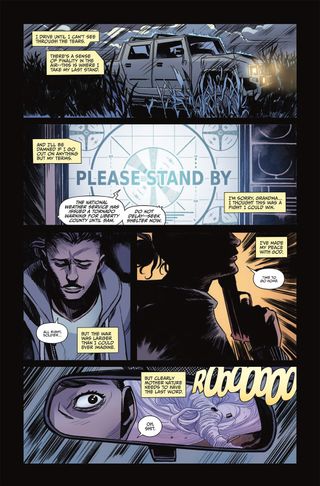
The other theme that I think we explore is legacy — Dorothy not only has to grapple with her grandmother's standing as a would-be liberator of Oz, but she has to face the fallout that came from her grandmother's good intentions. Because in a lot of ways, Oz is just as much as part of Dorothy as it is her grandmother.
And that's something the rest of the cast has to reckon with, too — they've all changed, and haven't been on the same side for a long time. They're torn between the idealistic pasts and the battle-scarred people they've become, and they're all trying to reconcile everything they've sacrificed in hope of a better future.
Nrama: Anything else you'd like to talk about that we haven't discussed yet?
Pepose: If you like The Old Guard, Mad Max: Fury Road, or Fables — or my previous work on Spencer & Locke — you're going to love The O.Z. It's a love letter and a dark parody, but at the end of the day, it's not a story that we're doing for shock value — shock value might get your foot in the door once, but it's not a way to build investment or emotional engagement.
We've taken the time and put in a lot of work to make sure our story can justify itself thematically, and as a result, I think you're going to fall in love with these characters quickly.
Zack is a comics journalist, who has written primarily for Newsarama, GamesRadar, and Indy Week. His words have also appeared in The Washington Post, AXS, VOX, The Sports Network, Gambit, and more.
Most Popular






